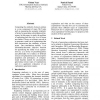Free Online Productivity Tools
i2Speak
i2Symbol
i2OCR
iTex2Img
iWeb2Print
iWeb2Shot
i2Type
iPdf2Split
iPdf2Merge
i2Bopomofo
i2Arabic
i2Style
i2Image
i2PDF
iLatex2Rtf
Sci2ools
114
Voted
COLING
2008
2008
Explaining Similarity of Terms
Computing the similarity between entities is a core component of many NLP tasks such as measuring the semantic similarity of terms for generating a distributional thesaurus. In this paper, we study the problem of explaining post-hoc why a set of terms are similar. Given a set of terms, our task is to generate a small set of explanations that best characterizes the similarity of those terms. Our contributions include: 1) an information-theoretic objective function for quantifying the utility of an explanation set; 2) a survey of psycholinguistics and philosophy for evidence of different sources of explanations such as descriptive properties and prototypes; 3) computational baseline models for automatically generating various types of explanations; and 4) a qualitative evaluation of our explanation generation engine.
COLING 2008 | Computational Linguistics | Distributional Thesaurus | Information-theoretic Objective Function | Semantic Similarity |
Related Content
| Added | 29 Oct 2010 |
| Updated | 29 Oct 2010 |
| Type | Conference |
| Year | 2008 |
| Where | COLING |
| Authors | Vishnu Vyas, Patrick Pantel |
Comments (0)

